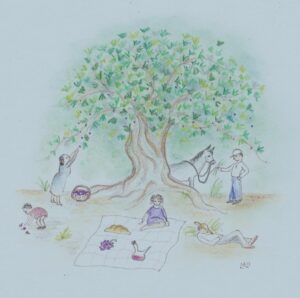While my uncle harnesses the horse to the farm cart, my mother and her sisters gather cutlery and linen. They fill baskets with food and the big porró with wine. My grandmother’s dirge about imminent disaster accompanies the loading of the food and the squeaking of the farm cart as we all clamber aboard for the six mile ride to the end-of-summer picnic site.
We are headed for a property that my grandparents own near a village named, poetically, Espígol, which means lavender in Catalan. On that land, surrounded by fields of ripening wheat stands The Fig Tree (la figuera). To my eyes, la figuera is as big as a house, as hushed and hallowed as a church. Its massive, twisted trunk splits into branches that arch almost to the ground, forming a green, cool refuge from the midday sun. The leaves are the size of a grownup’s hand, deeply indented, and raspy, which makes me wonder why Adam and Eve are always pictured wearing them. And there are figs, just now coming into ripeness and sending wasps and hornets into a drunken, buzzing frenzy.
La figuera shelters our entire tribe, including the horse. (To me having a meal in the same space as a horse is the most exciting part of the day.) Once the wagon is unloaded and horse is unhitched , the men gather wood and build the fire, with the women in the guise of Greek chorus, offering commentary. Then my grandmother sets upon the grill, as carefully as if they were jewels, the tiny ribs of unweaned baby goats and drizzles olive oil over them. Everyone exclaims about the rarity and deliciousness of these ribs, and how impossible it is to get them in Barcelona. I don’t consciously connect them with the goat kids I’ve seen scampering after their mothers when the herds are driven back to the village in the evening, but if I’m a vegetarian today it may have something to do with the memory of those diminutive ribs.
Everyone drinks wine out of the porró, that ancient peasant vessel invented to save glassware, and my uncle, after my mother spreads a thick woven napkin over the front of my dress, pours a thin stream of acid young wine into my mouth. For dessert there is my grandfather’s watermelon, small by American standards, perfectly spherical and, to my sugar-deprived palate, tasting as sweet as a bakery confection.
When the meal is over, my mother and her sisters surreptitiously let out their belts as they put away the dishes, my grandfather and uncle take a nap, and my father gazes out at the sun-drenched wheat fields stretching out all the way to the Pyrenees. My grandmother, for her part, is picking figs. After many warnings about wasps, she lets me help. She picks the ones on the tree while I concentrate on the fallen ones and listen to the drone of the women’s voices, the occasional snores of the nappers, and the rhythmic sounds of the horse munching grass.
Eventually the fig basket is full, the sleepers awaken, the horse is harnessed and we make our slow way back to the farm. As soon as we arrive, my grandmother sets out a large straw mat on the terrace and puts the figs on it to dry.
In the fall, when I morph again into a morose city child, my summer-brown feet encased in regulation oxfords, my arms restrained by the navy-blue uniform jacket, a basket arrives from my grandmother. In it are the last sausages from last year’s pig, six eggs individually wrapped in newspaper, a bag of dried figs and one of toasted almonds. Home for lunch, I stuff a few figs with almonds, and for the moment the sweetness and crunchiness in my mouth make the prospect of the afternoon spent learning German declensions more bearable.
Years later the remnants of a 7th century BC Iberian city, complete with defensive walls and towers, storehouses, and a sewer system, were excavated from the fields near Espígol. The fields and the fig tree are gone, but like the ancient city that once slept under its roots, the memory of those long-ago picnics lies dormant in my heart, waiting to be dug up, brushed off, and savored.



10 Responses
Always look forward to reading your memories.
Thank you for reading, Dot!
you are a great writer
emily
And you are very generous, dear Emily.
I am enthralled in luscious words, depicting scenes that I can savor and feel and long to read again. Thank you Lali🌻You really have an extraordinary way with words.
I’m so happy that you’re enjoying my writing!
Thanks for the trip – and I don’t even like figs!
It amazes me how much you remember.
It’s like pulling on the tiny end of a thread, and before you know it the sweater’s unraveled (or is it raveled?)>
Fresh figs, watermelon, wine, a thick hearty bread (not mentioned but imagined), a nap under the tree… why does it seem so hard to arrange such simple, profound pleasures now? No matter. Just absorbing this image is nurturing.
There was bread, of course. But there was no ice for drinks or to keep the meat from giving us botulism, no insect repellent to keep the wasps at bay, no sunscreen to prevent melanomas, no camp stools…so we were free to concentrate on the food, and on being there.